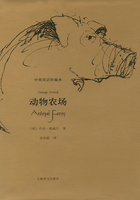At all the seasons which should have been their happiest,he invariably, and without intending it—nay, in spite of apurpose to the contrary—reverted to this one disastroustopic. Trifling as it at first appeared, it so connected itselfwith innumerable trains of thought, and modes of feeling,that it became the central point of all. With the morningtwilight, Aylmer opened his eyes upon his wife’s face, andrecognized the symbol of imperfection; and when they sattogether at the evening hearth, his eyes wandered stealthilyto her cheek, and beheld, flickering with the blaze of thewood fire, the spectral Hand that wrote mortality, wherehe would fain have worshipped. Georgiana soon learnedto shudder at his gaze. It needed but a glance, with thepeculiar expression that his face often wore, to change theroses of her cheek into a deathlike paleness, amid which theCrimson Hand was brought strongly out, like a bas-relief ofruby on the whitest marble.
Late, one night, when the lights were growing dim, soas hardly to betray the stain on the poor wife’s cheek, sheherself, for the first time, voluntarily took up the subject.
“Do you remember, my dear Aylmer,” said she, with afeeble attempt at a smile— “have you any recollection of adream, last night, about this odious Hand?”
“None! none whatever!” replied Aylmer, starting; butthen he added in a dry, cold tone, affected for the sake ofconcealing the real depth of his emotion: — “I might welldream of it; for, before I fell asleep, it had taken a prettyfirm hold of my fancy.”
“And you did dream of it,” continued Georgiana, hastily;for she dreaded lest a gush of tears should interrupt whatshe had to say— “A terrible dream! I wonder that you canforget it. Is it possible to forget this one expression? ‘Itis in her heart now—we must have it out!’ —Reflect, myhusband; for by all means I would have you recall thatdream.”
The mind is in a sad state, when Sleep, the all-involving,cannot confine her spectres within the dim region ofher sway, but suffers them to break forth, affrightingthis actual life with secrets that perchance belong to adeeper one. Aylmer now remembered his dream. He hadfancied himself, with his servant Aminadab, attemptingan operation for the removal of the birth-mark. But thedeeper went the knife, the deeper sank the Hand, untilat length its tiny grasp appeared to have caught hold ofGeorgiana’s heart; whence, however, her husband wasinexorably resolved to cut or wrench it away.
When the dream had shaped itself perfectly in hismemory, Aylmer sat in his wife’s presence with a guiltyfeeling. Truth often finds its way to the mind close-muffledin robes of sleep, and then speaks with uncompromisingdirectness of matters in regard to which we practise anunconscious self-deception, during our waking moments.
Until now, he had not been aware of the tyrannizinginfluence acquired by one idea over his mind, and of thelengths which he might find in his heart to go, for the sakeof giving himself peace.
“Aylmer,” resumed Georgiana, solemnly, “I know notwhat may be the cost to both of us, to rid me of thisfatal birth-mark. Perhaps its removal may cause curelessdeformity. Or, it may be, the stain goes as deep as lifeitself. Again, do we know that there is a possibility, on anyterms, of unclasping the firm gripe of this little Hand,which was laid upon me before I came into the world?”
“Dearest Georgiana, I have spent much thought uponthe subject,” hastily interrupted Aylmer— “I am convincedof the perfect practicability of its removal.”
“If there be the remotest possibility of it,” continuedGeorgiana, “let the attempt be made, at whatever risk.
Danger is nothing to me; for life—while this hateful markmakes me the object of your horror and disgust—lifeis a burthen which I would fling down with joy. Eitherremove this dreadful Hand, or take my wretched life! Youhave deep science! All the world bears witness of it. Youhave achieved great wonders! Cannot you remove thislittle, little mark, which I cover with the tips of two smallfingers! Is this beyond your power, for the sake of yourown peace, and to save your poor wife from madness?”
“Noblest—dearest—tenderest wife!” cried Aylmer,rapturously. “Doubt not my power. I have already giventhis matter the deepest thought—thought which mightalmost have enlightened me to create a being less perfectthan yourself. Georgiana, you have led me deeper than everinto the heart of science. I feel myself fully competent torender this dear cheek as faultless as its fellow; and then,most beloved, what will be my triumph, when I shall havecorrected what Nature left imperfect, in her fairest work!
Even Pygmalion, when his sculptured woman assumed life,felt not greater ecstasy than mine will be.”
“It is resolved, then,” said Georgiana, faintly smiling—“And, Aylmer, spare me not, though you should find thebirth-mark take refuge in my heart at last.”
Her husband tenderly kissed her cheek—her rightcheek—not that which bore the impress of the CrimsonHand.
The next day, Aylmer apprised his wife of a plan thathe had formed, whereby he might have opportunity forthe intense thought and constant watchfulness whichthe proposed operation would require; while Georgiana,likewise, would enjoy the perfect repose essential to itssuccess. They were to seclude themselves in the extensiveapartments occupied by Aylmer as a laboratory, andwhere, during his toilsome youth, he had made discoveriesin the elemental powers of Nature, that had rousedthe admiration of all the learned societies in Europe.















